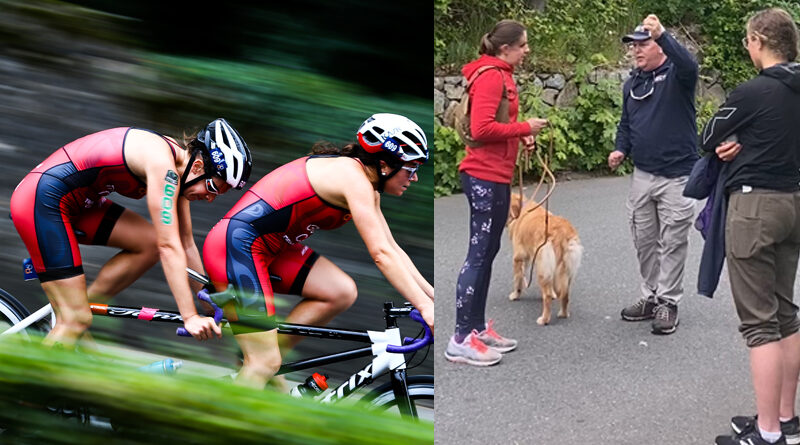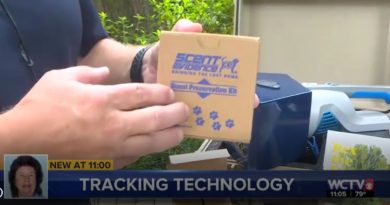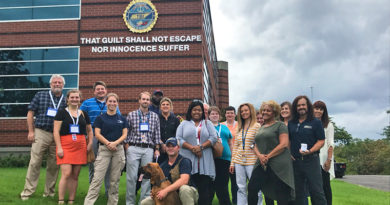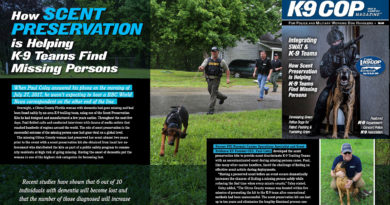World-ranked Para Triathlete and Trailing K-9 Follow Dream to Bring The Lost Home
Jessica Tuomela is the second-ranked Para Triathlete in the world, a four-time Paralympian, and now, a scent discriminate trailing K-9 Handler following her dream of finding missing persons.
In October 2020, Scent Evidence K9 received an email from this enthusiastic Canadian athlete wanting information about handler training and a dog for scent discriminate trailing. At first glance, this was a typical request about our services. Then came the lines, “In full transparency, I am completely blind. Yes, that changes how I handle a dog. But I also think it’s an advantage. I am looking for someone who is willing to work with me and is interested in thinking outside of the box,” said Jessica. We quickly responded to set up a call to discuss this amazing opportunity.
Scent Evidence K9 CEO, Paul Coley, and VP of Communications and Marketing, Joe Blanton, awaited the call after a long day of training Florida law enforcement K9 teams. “We didn’t really know what to expect but something about the possibility just felt right,” said Blanton. After a few introductions, Coley asked Jessica, who we now call Jess, “What are your thoughts about how this can work?’ Jess replied, “I rely on a dog every day to guide me.” That was the moment the wheels started turning and the dream began to take shape.
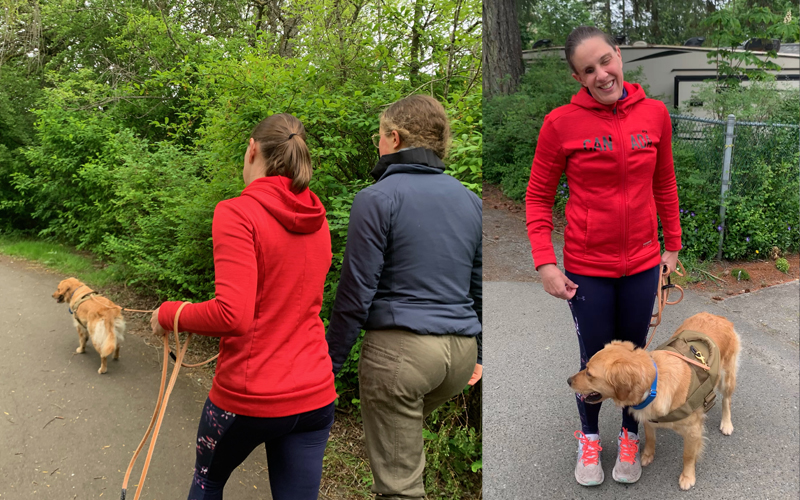
“A big component of our scent discriminate training is teaching the handler to accurately read dog communication as it travels up and down the lead,” said Coley. Jess was already an expert in this skill set. Over the next year and a half, K9 Lucy, a Golden Retriever, was trained using the rigorous Scent Evidence K9 M77 training plan. Coley ran trails blindfolded to simulate environmental conditions and tailor Lucy’s training plan to Jess’s needs. During this time, Jess was training with her guide dog and sharing videos with Coley when she wasn’t training for triathlons. “We would regularly show those videos in our training seminars to open handlers’ minds to what was possible with lead communication. She was truly reading the movements and feel of the dog,” said Coley.
Between a pandemic, travel restrictions, and world triathlon events, Coley was finally able to deliver Lucy to Jess in May 2022 and began training the new K9 team. Jess’s dream is to be a K9 Search and Rescue resource for vulnerable populations with Alzheimer’s Disease and autism who are at high risk of wandering in her community of Victoria, British Columbia. The area also has a large number of endangered missing girls and women. Jess trained that week with her partner, Kyle Coon, the third-ranked Para Triathlete in the world, and athletic guide, Emma Skaug. The promising new K9 Search Team found their first missing person two weeks later when a child with autism wandered away during a training exercise.
“Jess and Lucy are a perfect team capable of not only saving lives and bringing the lost home but inspiring others to find advantages and strengths that we have only begun to imagine. This experience has certainly inspired me and our company to work in unconventional ways to improve our training techniques,” said Coley. Jess is also working on getting the word out about Scent Evidence K9 Scent Kits to her community. Having a Scent Kit prepared gives K9 responders an uncontaminated scent article to search with. It can save valuable time when every second counts.
Jess was kind enough to share her personal journey with us in her own words. Here is her amazing story.
My Journey to Lucy – Jessica Tuomela
I’ve always loved dogs. That’s probably an understatement. Around age three, my parents took me to a local winter festival, and I vividly remember watching the dog sled pulling contest. My mind was blown. Dogs could have jobs? How did they learn how to do that? From that moment forward, and more than likely earlier, I took every opportunity to harass my parents for a puppy. Eventually, my antics prevailed, and I was gifted a Yellow Lab pup who became my best friend and my introduction into the dog world. He and I grew up together: swimming, exploring, camping, and getting into all sorts of trouble. But I always knew that I’d need a different kind of dog someday.
Around the age of 3 and a half, I began my life as a totally blind person, having lost my eyesight to Retinoblastoma. I suffered through learning how to use a white cane, knowing it was my only pathway to being able to get a guide dog. Working with a guide dog is very much a partnership. As the human part of the team, I need to have orientation skills that I can use to give direction to my guide dog. The dog does the navigating part. It’s very much a dance where quite often I must relinquish control and allow the dog to make decisions that ultimately keep us safe.
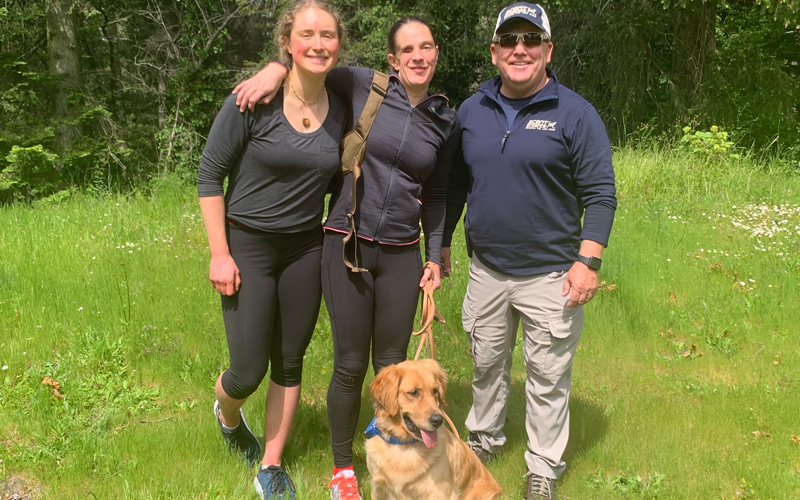
One of the very first things we learn when working with a guide dog is to let the dog lead. I make the decision to ask the dog to step off the curb to cross the street, but my feet do not move until the dog steps out. The dog’s body language is relayed to me through its harness handle. The dog slows, I slow. The dog weaves left; I weave left. It’s a dance I’ve been practicing since 2002 when I was matched with my very first guide dog named Jetta; a spitfire of a tiny black Lab. In the beginning, our dance moves weren’t so smooth. She knew what she was doing, but I was clueless. Letting her take the first step out; trusting her to make the right decisions; not completely understanding how to follow from the driver’s seat was a hard lesson. And, I go through it, to some extent, with every successor guide dog.
So many years and lessons later, enter my fourth guide dog Brandy, rescued by Three Little Pitties and trained into a guide dog by Leash of Hope Assistance Dogs. It was with my introduction to Brandy that I genuinely began my journey into working with working dogs beyond the capacity of a handler of a guide dog team. Since the day my parents brought home Sasha, I spent a good part of my time dreaming of how I could be a dog trainer. Real life kicked me in the pants, and I went to university instead. I encountered so many people who told me that a blind person could not possibly be a good dog trainer or handler. I hear that now, but I know better now. Despite years of being told “no” the desire to work with dogs never went away. I have had so many amazing experiences in my life. Two university degrees, living abroad, four Paralympic Games in two different sports, and yet the desire to work with dogs still niggled at the back of my brain, and ultimately my heart. I had volunteered for years with various dog organizations and of course, had my own pet dogs, but the prevailing misconception that blind people can’t work with dogs meant that entering the dog world as a professional was still a problem. Being matched with Brandy changed everything, or rather maybe it just changed my own perspective and determination.
I can’t say that Brandy would be an appropriate dog for most visually impaired handlers. She’s high-drive, incredibly intelligent, and fast. When I brought Brandy home, she also wasn’t at the stage of training that most guide dogs are at when they go home with their handlers. Leash of Hope Assistance Dogs afforded me the privilege of “finishing” Brandy’s training which ultimately meant a few bumps to the forehead and perhaps a few wrong turns here and there. When I asked her to step out, it was a whole new kind of trust than what I had been previously used to. But I think it was the experience of learning alongside the eleven-month-old Shepherd cross that prepared me for what was to come next.
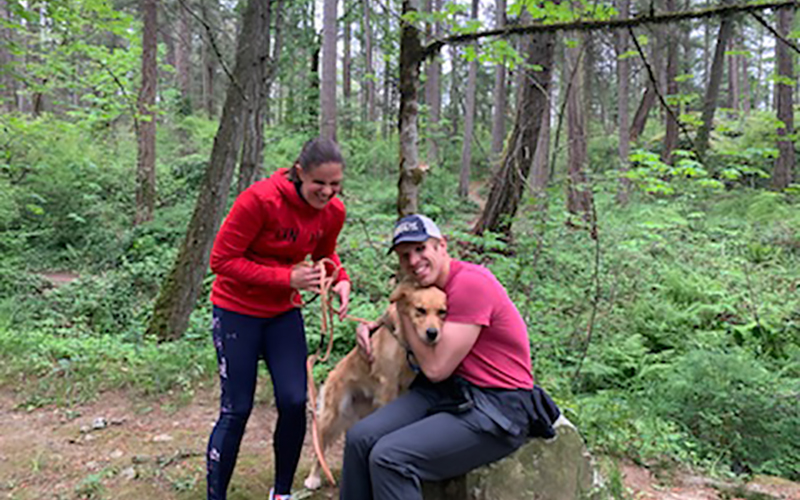
As I mentioned above, Brandy is not your typical guide dog. Part of the reason she was matched with me was because of my triathlon career. I had enough energy and stamina to wear her out, or at least, I thought I would. The thing about smart dogs is that you can take them on ten-kilometer runs with you and they still need mental work. Her body would be mostly tired, but her mind would be racing. Her guide work helped with that, but I had to find other productive outlets for her. That’s when I started researching nose games. My Google searches took me down so many rabbit holes, but I kept circling back to trailing. I had friends who did tracking with their pet dogs, but it never quite made sense to me. Why do I care if the dog leaves the trail I’ve made if they reach the target I want them to find? Perhaps my athlete brain was thinking: “work smarter, not harder.” Now, I’m not saying tracking is bad. As a blind handler, I am so used to following a dog the way they think it’s safe, that forcing a dog to follow a trail that I’ve determined just doesn’t make sense. After months of researching, I determined that trailing was something I wanted to do. But the question was: how? An email frenzy began.
Over the course of a few weeks, I emailed and called several companies both in Canada and the United States. I enquired about dogs, how they were trained, what the process was to get one, would anyone work with me and train me? The answer was usually “no.” Some companies refused because they saw me as a liability. Others seemed only interested in $$. I wanted a company that cared about the work they were doing. Showed passion for a cause and for their dogs. I wanted a company with heart. I was beginning to think that I wouldn’t find anyone, and YouTube videos were not helpful training tools.
I wouldn’t say that Scent Evidence K9 was my last hope. I had emails out to other companies when I received a reply, saying that Paul and Joe would at least talk over the phone with me. To say I was excited is definitely an understatement. Here was a company that seemed to know what they were doing and also seemed very community involved. All I could think leading up to the call was, “don’t screw this up.” Not only was I a layperson wanting a Scent Evidence K9 dog, but I was also a blind layperson. There was absolutely no reason for Paul to think that I could possibly handle a trailing dog.
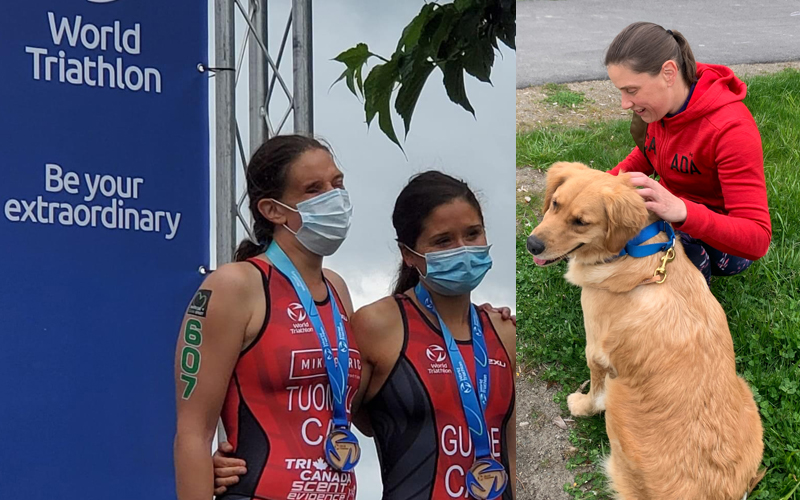
Today, almost two years later, a beautiful Golden Retriever named Lucy lies at my feet as I write this. I’m not sure what I said or didn’t say, but Paul has entrusted one of his highly trained Scent Discriminate trailing dogs to me. It’s quite the story of how Lucy finally got to me. A pandemic, travel restrictions and much more made it almost impossible for her to get to Victoria, British Columbia, Canada. The good news is that we completed our handler training in a whirlwind of two days and are already bonding. The skills that my four guide dogs have taught me and the experiences of being an elite Para Triathlete have given me the ability to embark on this adventure with the potential for some great success. It’s been a long time coming, since that first Yellow Lab puppy, but I think I’m ready now to be the best partner for Lucy. Some people have told me that I could write a book. If that is so, if you will excuse the cliche, I will say that Lucy and I are definitely starting a new chapter.
To learn how you can help K9 responders find a missing person faster by preparing a Scent Kit in advance, CLICK HERE.

